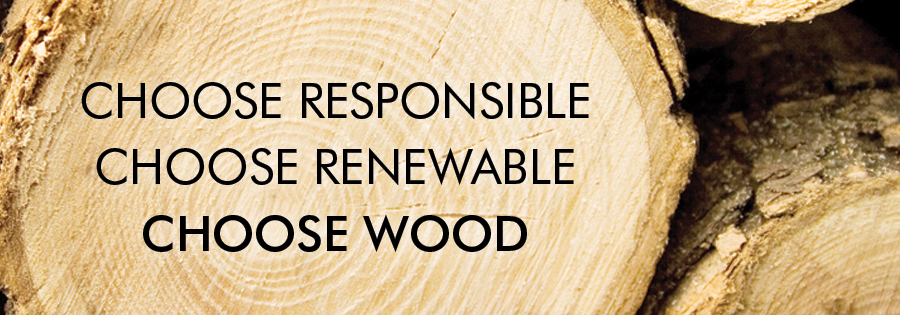Why wood is a superior sustainable building material.
With intensified interest in environmental impact and green building, here are a few attributes that make wood a good choice. It's also important to understand how engineered wood products can be used to meet the emerging standards and requirements for green building.

Wood is renewable, like any crop. Engineered wood products can use smaller trees from well-managed forests, saving old growth for future generations to enjoy. Forest land comprises about 33 percent of total U.S. land area. Demand for more engineered wood products encourages forest land owners to maintain healthy forest regeneration, which in turn helps absorb more greenhouse gases.
Manufacturing engineered wood uses less energy than producing steel or concrete, reducing greenhouse gas and other air-polluting emissions related to construction.
Wood sequesters carbon. By trapping the carbon removed from the environment during the trees’ growth, buildings made with engineered wood can continue to have a net benefit on the environment when compared to their steel and concrete counterparts.
Read more in Sustainable Buildings, Sustainable Future, Form F305. GO >.
Life Cycle Assessment
The Life Cycle Assessment (LCA) measures the energy required for a product or structure over its period of use due to raw material extraction and manufacture through distribution, use, maintenance, and disposal. LCA tools allow building professionals to compare different products, assemblies, and building designs based on their environmental impacts, which allows them to make more informed choices about the materials they use.
The Consortium for Research on Renewable Industrial Materials (CORRIM) conducted a study that examined the construction and performance of houses in the cold climate of Minneapolis and the hot, humid climate of Atlanta. This study found the use of wood in both locations presented significantly less environmental risks than the steel-frame or concrete-frame alternatives. The results demonstrated wood's benefits in almost all five categories of embodied energy, global warming potential, air emission index, water emissions, and solid waste.
CORRIM conducts and manages research on the Life Cycle Assessment and the environmental impacts of product, use, and disposal of forest products.
GO NOW >
Forest Certification and APA Members
Forest certification programs verify the sustainable forest management practices of land management companies, forest product manufacturers, and other related organizations. View a list of the forest management certifications of select APA member manufacturers.
GO NOW >
Organizations, Tools, and Programs
Athena Sustainable Materials Institute GO >
The Athena Sustainable Materials Institute is a non-profit research and cooperative bringing life cycle assessment to the construction sector.
Building for Environmental and Economic Sustainability (BEES) Software GO >
The BEES software brings to your fingertips a powerful technique for selecting cost-effective, environmentally-preferable building products.
Dovetail Partners GO >
Dovetail Partners provides authoritative information about the impacts and trade-offs of environmental decisions, including consumption choices, land use, and policy alternatives.
Forest Stewardship Council GO >
The Forest Stewardship Council sets standards for responsible forest management. A voluntary program, FSC uses the power of the marketplace to protect forests for future generations.
Forestinfo.org GO >
Forestinfo.org is Dovetail Partners' one-stop site for environmental education resources that is understandable, unbiased, accurate, and available in a wide variety of formats.
FPInnovations GO >
FPInnovations specializes in the creation of innovative scientific solutions in support of the Canadian forest sector's global competitiveness and responds to the priority needs of its industry members and government partners.
The Green Building Initiative GO >
The Green Building Initiative offers Green Globes environmental assessment and certification programs for commercial buildings.
The National Institute of Standards and Technology (NIST) Engineering Laboratory GO >
The Engineering Laboratory promotes U.S. innovation and industrial competitiveness by advancing measurement science, standards, and technology for engineered systems in ways that enhance economic security and improve quality of life.
Home Innovation Research Labs GO >
Home Innovation Research Labs is a full-service market research, consulting, product testing, and accredited third-party certification agency dedicated solely to issues related to the home building industry.
Think Wood GO >
Think Wood promotes the economic, environmental, and societal benefits of using softwood lumber in commercial, community, and non-residential building applications.
Society of American Foresters GO >
The Society of American Foresters aims to advance sustainable management of forest resources through science, education, and technology.
Sustainable Forestry Initiative GO >
Sustainable Forestry Initiative is dedicated to promoting sustainable forest management and works with conservation groups, local communities, resource professionals, landowners, and countless other organizations and individuals who share a passion for responsible forest management.